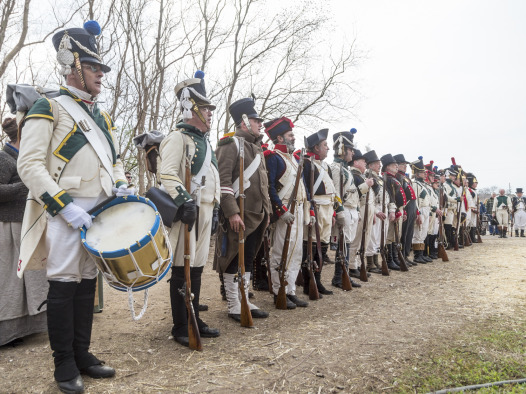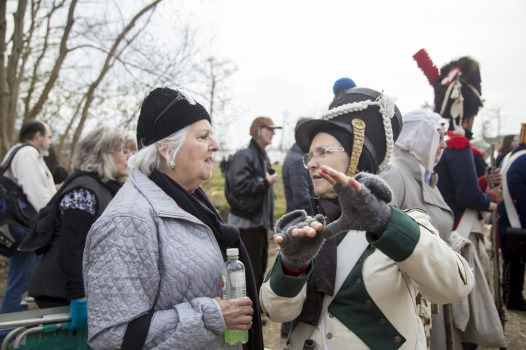History then and now merged in a poignant and improbable moment in present day New Orleans.
Walking along a dry, brown rutted track twisting through a hardwood thicket in Chalmette, I heard ahead the opening words of the Marseillaise, the French national anthem.
Allons enfants de la patrie … Arise children of our country.
Voices were raised in song in a dry, dirt field in America, where we had just watched the reenactment of a battle against the British that took place 200 years ago. Whatever were the French doing here?
I turned a corner and there they were: A line of almost two dozen soldiers clad in crisp white wool and tall, stovepipe black hats, standing shoulder to shoulder along the edge of the road, singing a cappella. Erect, proud, focused.

French militiamen joined together in song following the final Battle of New Orleans. (Photo: Hanna Rasanen)
Aux armes, citoyens! Formez vos bataillons! … To arms, citizens! Form your battalions!
We stopped to watch, caught up in this seemingly spontaneous expression of patriotism, those of us who spoke French joining in. The phrases hung in the still morning air, ripe with meaning.
Liberté, Liberté chérie, Combats avec tes défenseurs! … Liberty, beloved Liberty, Fight with your defenders!
As the final words died away, the group’s leader commanded, in French, to lay down arms. Long rifles were lowered, spines relaxed, casual conversation ignited.

Despite language barriers, re-enactors happily enlightened spectators on the lives of the French militiamen (and women). (Photo: Hanna Rasanen)
It turns out that these French re-enactors had traveled from southwest France – from old and historic cities like Toulouse and Pau – to represent the French-speaking participants in The Battle of New Orleans on Jan. 8, 1815. Many New Orleanians were native French speakers at the time, and General Andrew Jackson’s orders had to be translated for them.
Most of this group, too, spoke no English. Yet here they were, in a field in Chalmette, joining some 1,800 other mock soldiers to re-enact this country’s decisive victory in the final battle of The War of 1812, one that prompted the ratification of the Treaty of Ghent, and cemented American ownership of the Louisiana Territory.
I stopped to chat with one of the French militiamen. His group, he told me in French, are re-enactors back home, too, where they help stage various historic battles each year. This was their first trip to New Orleans, and to the Louisiana Living History Foundation’s new battlefield in Chalmette, where the organization will stage annual New Orleans 1815 events.
I am so sorry for what is happening in France now, I told him. He smiled. “You are the Big Devil,” he said, “and we are the Little Devil.” Then he crossed two fingers of one hand. “We are like this, America and France. We are together.”
There were no pens on this battlefield – unless you count the authentic quill sets being sold in the open-air market adjacent to the battlefield. The weaponry on view ran to muskets and cannons, not Kalashnikovs.
And there were no signs reading “Je suis Charlie.”
But that sense of solidarity – that there is more that connects rational people in this world than separates them – was as real in Chalmette on Sunday as in town squares across the world.
Liberté in action. There and here. Then and now.
 NOLAbeings Multimedia artist Claire Bangser created NOLAbeings as a portrait-based story project that marries...
NOLAbeings Multimedia artist Claire Bangser created NOLAbeings as a portrait-based story project that marries...  Voodoo in New Orleans: Reviving history: New Orleans fortune telling This article takes a deep dive into the history of Voodoo in New Orleans, its hybridization with Catholicism, and its present-day place in the city's culture. The author visits fortune-tellers in the French Quarter, using their guidance as a tool for introspection rather than a deterministic predictor of the future. Through her experiences in New Orleans, the author feels a mystical connection to both the past and the future.
Voodoo in New Orleans: Reviving history: New Orleans fortune telling This article takes a deep dive into the history of Voodoo in New Orleans, its hybridization with Catholicism, and its present-day place in the city's culture. The author visits fortune-tellers in the French Quarter, using their guidance as a tool for introspection rather than a deterministic predictor of the future. Through her experiences in New Orleans, the author feels a mystical connection to both the past and the future. 